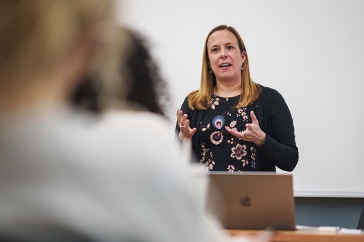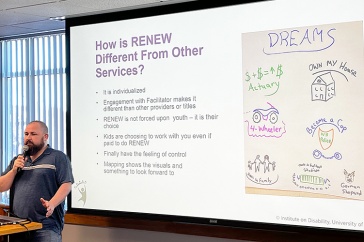
Borja Alvarez de Toledo, president and CEO of Waypoint, speaks with UNH President Jim Dean during an Embrace New Hampshire Bus Tour stop this spring that brought UNH leadership to Manchester to visit organizations with which the university has strong partnerships.
Things can be a little chaotic even on a normal day in Michele Caswell’s house. Having seven kids – a blend of foster and adopted children, many of whom have special needs – is certainly never boring.
So, when something unexpected and challenging happens – like suddenly having one of those children in the pediatric intensive care unit for several weeks – it doesn’t take long for chaotic to turn to overwhelming.
When that very scenario unfolded recently, Caswell and her wife, Sharon, turned as they often do for support to Waypoint NH, a social services and advocacy organization based in Manchester that helps Granite Staters in need in all corners of the state. Waypoint offers services that span a wide range of ages, from prenatal and early childhood all the way to senior populations.
Waypoint case managers delivered gas cards to Michele and Sharon throughout the unexpected stretch, easing the burden of suddenly regular trips to visit their child in the ICU, about an hour-and-a-half from their Raymond home. That help came in addition to the routine check-ins and consistent offers of additional assistance anyone in the household might require.
“Any support we need, they are there with it,” Caswell, who along with Sharon has fostered newborns who have been born addicted, children facing severe neglect and those requiring feeding tubes or facing challenging genetic diagnoses, says. “They aren’t just about early intervention services; they are about taking care of our whole family. We’re so lucky to be connected with them.”
"UNH has always been our go-to. It's been an invaluable partnership. They've always done a great job of reaching out to providers like us and trying to keep the population that was trained at UNH in the state."
Among the many strong connections Waypoint has in the Granite State is one with UNH, which has helped prepare workers to fill critical roles like the case managers assisting Caswell’s family. UNH has long been a preferred source of interns at Waypoint – the organization hosted 19 interns from UNH between 2019 and May of 2023, accounting for almost a third of its total internships in that time – and that partnership has created a fruitful pipeline from intern to full-time staffer that continues to fuel Waypoint’s manpower.
More than 35 current Waypoint staffers have come from UNH.
“UNH has always been our go-to,” says Borja Alvarez de Toledo, president and CEO of Waypoint. “It’s been an invaluable partnership. They’ve always done a great job of reaching out to providers like us and trying to keep the population that was trained at UNH in the state. We’ve always had a strong connection with UNH.”
The organization has structured its internship program specifically to encourage the transition to full-time employment, building a culture around things like coaching and professional development.
That was part of the appeal to Alicia Faucher ’24, who completed an internship with Waypoint via independent study as a junior at UNH and accepted a position within the transitional living program while she’s completing her undergraduate work.
The transitional living program is part of the runaway and homeless youth continuum and is designed to transition young people from being housing-unstable or homeless to an independent living situation over a 12-to-18-month timeline. To be admitted to the program, clients must be between 18 and 21 years old.
As housing support staff, Faucher works in the evenings, primarily hosting social activities around things like board games, puzzles or painting, though she also does some crisis intervention and often assists in helping hone essential life skills – such as budgeting and meal planning – that play such a critical role in transitioning to independent living.
The culture Waypoint fosters was a significant factor in Faucher choosing to stay on following her internship.
“I had two different job offers, but what really made me choose Waypoint was knowing what the company’s values are and how respectful and accepting of a place it is,” Faucher says. “It’s just a really great environment to be in.”
It’s also a large environment, with more than 300 staffers positioned throughout the state – 95 percent of whom are visiting homes and embedded in the community in which they work – in divisions that include early childhood and family support, resources for families affected by incarceration, services for young people experiencing homelessness, and home care for older adults and adults with disabilities. Alvarez de Toledo says Waypoint is “probably the only agency in New Hampshire that really starts in prenatal and offers services all the way to senior ages.”

It’s often emotionally taxing work, as Waypoint staffers help community members through truly challenging times. The family preservation division, for instance, focuses on families in crisis – children that have been hospitalized or are at risk of being placed out of the home, often through the juvenile justice system. Many of those connections are court-ordered when there is an allegation of abuse or neglect.
The COVID-19 pandemic presented additional unique challenges on several fronts. With families quarantined and isolated, it was much harder for case managers to routinely “have eyes” on the children, Alvarez de Toledo says, and children were less likely to be able to visit the pediatrician or attend school. The stress of everyone being in the home full-time without a break only exacerbated issues such as domestic violence and alcohol consumption, he adds.
Additionally, it was difficult to stay in touch with Waypoint’s homeless population, as many of the organization’s homeless clients have cell phones but few have Wi-Fi service, and most of the outposts they’d typically visit to tap into it – like the public library or a McDonald’s – weren’t open to the public.
Those kinds of challenges make having trusted staff even more important. To that end, Alvarez de Toledo is driven to continue strengthening the relationship with UNH by becoming more proactive rather than reactive, in hopes of creating even more opportunity for collaboration.
“We want to be much more intentional about our relationship. This summer we hope to talk about how many internships we’d like to fill and in what places, so we can present it to UNH ahead of time rather than scrambling to fill a need,” Alvarez de Toledo says. “We want to be seen as one of the preferred destinations for the College of Health and Human Services to place its students.”
That would open the door for more students like Faucher and create opportunities for Waypoint to help more people like Caswell, who has had foster children stay for as little as two days and as long as five years. She relies on Waypoint for countless services to make the transition as easy as possible for the children, from making mental health assistance available to collaborating with local school districts to things as casual as hosting family activity nights.
“We pretty much exclusively foster children with special needs, so we depend heavily on community resources like Waypoint to support our family in all kinds of ways,” Caswell says. “We would not be able to take in these children if we didn’t have that support. Waypoint really encompasses the whole family.”
-
Written By:
Keith Testa | UNH Marketing | keith.testa@unh.edu
















































